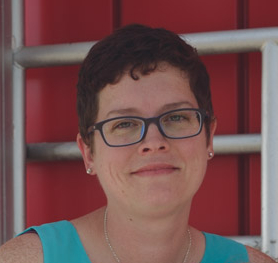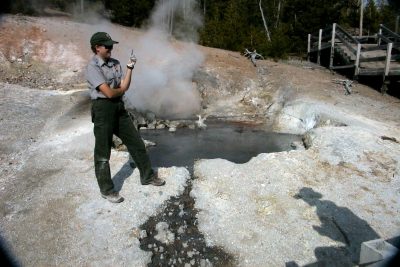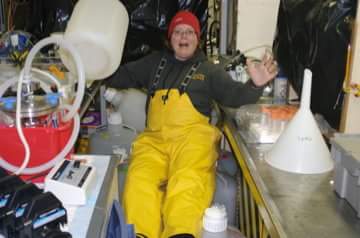Kendra R. Maas, Ph.D.

Facility Scientist
Research Background
Kendra has worked in microbial ecology since 2000, the early days of the molecular revolution of advances in sequencing technology that has enabled us to explore the vast diversity of microbes. She started working as a microbiologist immediately after finishing her B.S. in Biology at Southwest Missouri State University. Her first job was a park ranger in the Yellowstone Center for Resources (Yellowstone’s research division). Not only is Yellowstone a major birthplace of molecular techniques (taq polymerase, the enzyme that helped launch DNA sequencing into the mainstream, comes from a thermophile isolated from a hotspring in Yellowstone), the microbial communities inhabiting the hot springs are a great natural ecology experiment. In 2003, she left the park service to pursue her Ph.D. at the University of New Mexico in Cristina Takacs-Vesbach’s lab conducting a Yellowstone wide survey of bacterial thermal communities. She defended Her dissertation “Controls on microbial community structure in thermal environments; exploring Bacterial diversity and the relative influence of geochemistry and geography.” in
Her first job was a park ranger in the Yellowstone Center for Resources (Yellowstone’s research division). Not only is Yellowstone a major birthplace of molecular techniques (taq polymerase, the enzyme that helped launch DNA sequencing into the mainstream, comes from a thermophile isolated from a hotspring in Yellowstone), the microbial communities inhabiting the hot springs are a great natural ecology experiment. In 2003, she left the park service to pursue her Ph.D. at the University of New Mexico in Cristina Takacs-Vesbach’s lab conducting a Yellowstone wide survey of bacterial thermal communities. She defended Her dissertation “Controls on microbial community structure in thermal environments; exploring Bacterial diversity and the relative influence of geochemistry and geography.” in  2009 and moved to University of British Columbia to take a Tula Foundation Post-doctoral Fellowship. Her first postdoc project was in the labs of Steven Hallam and Phil Tortell where she established a field sampling program along an open ocean transect, sampling both microbial communities through metagenomic sequencing of large insert libraries and biologically relevant gases. Her second postdoc project was in Bill Mohn’s lab where she studied bacterial and fungal communities from forest soils across North America.
2009 and moved to University of British Columbia to take a Tula Foundation Post-doctoral Fellowship. Her first postdoc project was in the labs of Steven Hallam and Phil Tortell where she established a field sampling program along an open ocean transect, sampling both microbial communities through metagenomic sequencing of large insert libraries and biologically relevant gases. Her second postdoc project was in Bill Mohn’s lab where she studied bacterial and fungal communities from forest soils across North America.
Kendra brought her expertise in processing and analyzing a wide variety of microbial communities to UConn in 2015. The rapid evolution of sequencing technology has made it feasible both technically and fiscally to add a microbiome component to many experimental systems. Kendra’s experience with tens of thousands of samples from both the environment and host associated means that she can help users get microbial DNA and sequences out of nearly anything. She has also been through several major shifts in methods for analyzing microbial communities from fingerprinting techniques, to clone libraries and Sanger sequencing, to next gen sequencing with 454 and MiSeq. When the next shift happens, she will bring it to MARS and help users transition.
Kendra’s goal as the MARS facility scientist is to help anyone who is interested explore the incredible diversity of the microbes in their system which is why she also helps users analyze their communities. Processing targeted sequencing like we use for microbiome studies is very different than processing whole genome sequencing, standard bioinformatic tools typically do not work. But Kendra can help users either learn to process these data through workshops or one on one training or process the data in MARS as a service. Once the sequences are processed, users are faced with combining a multivariate community dataset with multivariate experimental datasets and search for patterns. Analyzing these data is also a rapidly evolving field, one that Kendra actively participates in. She can help users run appropriate statistical analyses or perform the analyses as a service. Kendra also offers workshops in statistical analysis of microbial communities and general use of R.
All MARS services and workshops are open to UConn, UConn Health, and non-UConn affiliated users. Please contact Kendra to discuss current or future projects.